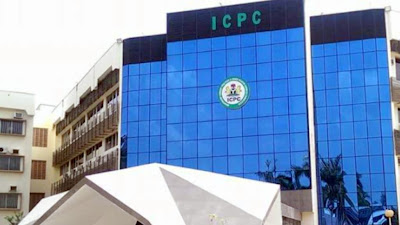Prof. Bolaji Owasanoye (SAN), Chairman of the Independent Corrupt Practices and Other Related Offences Commission, revealed on Friday that a former military chief was under investigation for depositing N4 billion military budget into the accounts of his two companies to which he is a signatory.
But he said the trial of the affected officer was “strangely and perversely frustrated” by a recently retired High Court judge who allegedly decided to forfeit some of the assets to Federal Government of Nigeria while leaving the rest to the suspect.
The commission, he said, had also uncovered how a military contractor allegedly received N6 billion from the Nigerian Army in suspicious circumstances and in violation of extant legislation.
Besides, another N1 billion for security operations was allegedly diverted by some civil servants to four shell companies.
He described corruption as a major contributory factor to security challenge across the country.
He said about $15 billion has been squandered through fraudulent arms procurement deals in the last 20 years in the country.
Owasanoye spoke during the National Policy Dialogue on “Corruption and Insecurity in Nigeria” in Abuja, saying cases of job racketeering abound in the security sector.
He said: “At face value, insecurity is seen to be, and is sometimes treated as a matter requiring only a military response or reaction, but an in depth look into its possible root cause(s) shows that corruption is a major contributory factor to the continued existence and propagation of insecurity in the country.
SOCIETY ‘Ooni’s Estranged Wife, Ex-Queen Naomi Begs To Return To Palace’
“In fact, a clinical diagnosis of the insecurity menace in the country reveals that to effectively combat insecurity we require the collaborative efforts of security agencies (the military, intelligence, Police, Customs, Prisons, others), as well as Law Enforcement and Anti-Corruption Agencies.
“ICPC’s research and investigation findings on the subject matter show that public sector corruption, directly and indirectly, enables insecurity, and can sometimes complement it.
“Cases of job racketeering abound in the security sector, many of which are under investigation by the ICPC.
“There are also ongoing investigations into military contracts spending. Recently, ICPC arrested a military contractor that received over a period of less than ten years cumulative sum of about N6 billion from the Nigerian Army in suspicious circumstances and in violation of extant legislation.
“The Commission’s recovery of huge cash sums in local and foreign currencies, luxury cars, customized mobile phones, designer watches including three Rolexes as well as property documents from the premises of the contractor underscores the corruption that often attends military procurement.
“Some former military and security personnel are being investigated by ICPC and our sister agency for embezzlement of funds allocated to security.
“For example, a former head of one of the arms of the military in the twilight of his tenure deposited the sum of N4 billion from military budget into the accounts of two companies where he is beneficial owner and sole signatory.
“The proceeds were used to purchase properties in Abuja in the names of cronies and proxies. Some of the properties paid for by his service were also fraudulently converted to his use.
“ICPC’s prosecution of this high ranking officer to recover all the implicated assets was strangely and perversely frustrated by a recently retired High Court judge who decided to forfeit some of the assets to Federal Government of Nigeria and the rest left to the suspect.
“While the Commission has filed notice of appeal, this strange development aggravates an already bad situation and escalates insecurity and impunity.”
Owasanoye made more startling revelations in the presence of top military brass, including the National Security Adviser, Gen. Babagana Monguno.
He said plans to retool the Nigeria Police Force was being threatened by corruption.
He added: “Another case under investigation is theft of part of special intervention fund approved for security operations by some civil servants in the line ministry who transferred about N1 billion to four shell companies.
“A special investigative team under the leadership of NSA and ICPC recovered some of the diverted assets including state of the art building located in Abuja and over N220 million cash. Investigation in this matter is still ongoing.
“Funds to retool and reposition the police to a world class institution are no less threatened by corruption.
“The newly established police special intervention framework designed to eliminate underfunding of the police, the Police Trust Fund, is already under ICPC investigation for abuse, fund diversion bogus, questionable welfare packaging that is not for the police who are the beneficiaries of the fund and sundry corrupt practices.
“One may safely conclude that other security agencies are dogged by similar practices albeit to varying degrees.
“In the past seven years, the government of President Muhammadu Buhari and the 9th National Assembly have ensured significantly increased funding for the security sector.
“Part of our interrogation today is why has this proactive effort not translated into commensurate effectiveness in the war against insurgency and insecurity and despite the gallant and sacrificial effort of our soldiers, policemen and other security operatives working daily to secure Nigerians.
“Experts have attributed the aggravation of insecurity partially to misapplication and misappropriation of funds in the defence sector procurement practices. Investigations by anti-corruption agencies will seem to bear this out.
“What is worse is that soldiers are often reported in social media of complaining of being poorly-equipped and poorly motivated.
“These challenges can be partly traced to the revelation by the Centre for Democracy and Development, (CDD) that about $15 billion has been squandered through fraudulent arms procurement deals in the last 20 years in the country.”
The ICPC chairman explained why the commission was engaging in dialogue as part of proactive measures.
He said: “While ICPC and EFCC are investigating some of these anomalies, our efforts will not yield much without proactive prevention measures and a review of extant procurement practices.
“ICPC in furtherance of its statutory mandate to prevent corruption by review of the systems, processes and practices of agencies of government and to direct improvement where they predispose to corruption has through its research and training arm convened this policy dialogue.
“We hope that informed views and contributions from the broad spectrum of stakeholders present here will clear misconceptions and offer new recommendations for dealing with this issue.”
Also speaking, Senate President Ahmad Lawan said the National Assembly was looking into the possibility of anti-corruption law to stop illicit financial flows suspected to be funding routes for insecurity in Nigeria.
He said: “Insecurity has placed an enormous demand on our country’s human and material resources, particularly the emergence of the Boko Haram insurgents in the Northeast and banditry in the Northwest.
“Several other security challenges have since emerged afterwards. We have been faced with cattle rustling and farmer herder clashes in the middle belt, secessionist agitations in the South East, militancy in the south-south, some of these have now spilled over to other parts of the country.
“The span of these security challenges have profoundly tasked this administration and indeed the nation, and stretched our security and law enforcement apparatus which remains determined and has withstood these challenges with utmost gallantry. But as I have always said, the challenges of our security infrastructure are the concern of all of us and not just of those in government alone.
“We on our part as legislators have continually supported the effort of the government to tackle insecurity in Nigeria. In the past three years, the National assembly has ensured that appropriation for defence and security is improved upon, year on year…
“The National Assembly while looking into the possibility of unmasking the perpetrators of insecurity in Nigeria, realised the need for an anticorruption law to stop illicit financial flows suspected to be funding routes for insecurity in Nigeria.
“The 8th Assembly passed the Nigeria Financial Intelligence Unit (NFIU) Bill, which is one of the major anti-corruption laws that saved the country from being expelled from the global body of the Egmont Group.
“In the same vein, the 9th Assembly, working closely with security and law enforcement agencies to further strengthen their capacity to withstand unscrupulous elements involved in criminal and terrorist activities against the state, passed three bills aimed at combating money laundering, terrorist financing and the proceeds of crime.
“These three bills are in tandem with this administration’s commitment to fight corruption and curb insurgency in the country.”
Lawan said the National Assembly was expecting “eventual policy brief that will be shared hereafter to guide the nation’s policy direction in ending insecurity in Nigeria”.
He added: “Only recently, the President gave a marching order to the armed forces to extinguish bandits, kidnappers and other criminal agents against the state and her citizens, by December 2022.
“This administration is committed to achieving this set target. Accordingly, the past few weeks have seen security agencies flushing out terrorists from their hideouts in Kaduna Birnin-Gwari axis, Katsina, Zamfara and Sokoto. Similar results were recorded in Niger, where, like in Kaduna, the Nigerian Air Force neutralized many terrorists.”













